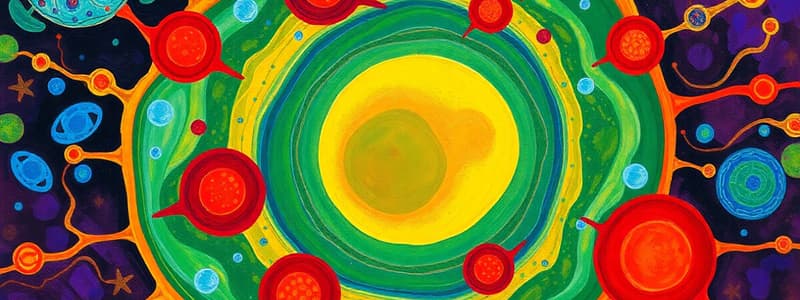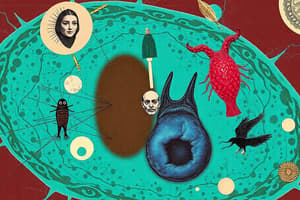Podcast
Questions and Answers
Which of the following is NOT a key molecule studied in biochemistry?
Which of the following is NOT a key molecule studied in biochemistry?
Which field of study focuses on the functions of living organisms and how their internal systems work together?
Which field of study focuses on the functions of living organisms and how their internal systems work together?
Which of these is NOT a key role of microorganisms in ecosystems?
Which of these is NOT a key role of microorganisms in ecosystems?
What is the primary function of metabolism in living organisms?
What is the primary function of metabolism in living organisms?
Signup and view all the answers
Which of these is NOT an example of a physiological adaptation?
Which of these is NOT an example of a physiological adaptation?
Signup and view all the answers
Which of the following is NOT a key component of a eukaryotic cell?
Which of the following is NOT a key component of a eukaryotic cell?
Signup and view all the answers
Which of the following is NOT a subdiscipline of biology?
Which of the following is NOT a subdiscipline of biology?
Signup and view all the answers
What is the primary function of genes?
What is the primary function of genes?
Signup and view all the answers
Which of the following is a key mechanism driving evolution?
Which of the following is a key mechanism driving evolution?
Signup and view all the answers
What is the main difference between prokaryotic and eukaryotic cells?
What is the main difference between prokaryotic and eukaryotic cells?
Signup and view all the answers
In an ecosystem, what is the relationship between a predator and its prey?
In an ecosystem, what is the relationship between a predator and its prey?
Signup and view all the answers
Which of the following is NOT a source of evidence for evolution?
Which of the following is NOT a source of evidence for evolution?
Signup and view all the answers
What is the primary way that genetic information is passed from parents to offspring?
What is the primary way that genetic information is passed from parents to offspring?
Signup and view all the answers
Flashcards
Microbiology
Microbiology
The study of microscopic organisms like bacteria and viruses.
Microbial roles
Microbial roles
Microorganisms aid in nutrient cycling and decomposition in ecosystems.
Biochemistry
Biochemistry
The study of the chemical processes in living organisms.
Metabolism
Metabolism
Signup and view all the flashcards
Physiology
Physiology
Signup and view all the flashcards
Biology
Biology
Signup and view all the flashcards
Cell
Cell
Signup and view all the flashcards
Prokaryotic Cell
Prokaryotic Cell
Signup and view all the flashcards
Eukaryotic Cell
Eukaryotic Cell
Signup and view all the flashcards
Genetics
Genetics
Signup and view all the flashcards
Natural Selection
Natural Selection
Signup and view all the flashcards
Ecology
Ecology
Signup and view all the flashcards
Evolution
Evolution
Signup and view all the flashcards
Study Notes
Introduction to Biology
- Biology is the scientific study of life and living organisms.
- It encompasses many subdisciplines including botany (plants), zoology (animals), microbiology (microorganisms), and genetics (heredity).
- The study of biology involves investigations into structure, function, growth, evolution, distribution, and taxonomy of living things.
- Biological principles are essential for understanding the natural world and address crucial issues in health, environment, and technology.
Cell Biology
- Cells are the fundamental units of life, and all living organisms are composed of cells.
- Two main types of cells exist: prokaryotic cells (lack a nucleus and membrane-bound organelles) and eukaryotic cells (have a nucleus and membrane-bound organelles).
- Key cell components include the nucleus, cytoplasm, cell membrane, and various organelles (e.g., mitochondria, ribosomes).
- Cells have diverse functions, from carrying out metabolism and reproduction to responding to stimuli.
Genetics
- Genetics is the study of genes, heredity, and genetic variation.
- Genes are segments of DNA that carry the instructions for building and maintaining an organism.
- Genetic information is passed from parents to offspring through reproduction, influencing traits.
- Concepts like DNA replication, transcription, and translation are crucial for understanding gene expression.
- Mutations in genes can lead to changes in traits, which can be beneficial, harmful, or neutral.
Evolution
- Evolution is the process by which populations of organisms change over time.
- Natural selection is a key mechanism of evolution, favoring organisms with traits that enhance survival and reproduction.
- Genetic variation within populations is essential for evolution.
- Evolution can result in the development of new species and adaptations to diverse environments.
- Evidence for evolution comes from fossil records, comparative anatomy, and molecular biology.
Ecology
- Ecology is the study of interactions between organisms and their environment.
- Ecosystems are complex systems containing biotic (living) and abiotic (non-living) factors.
- The interrelationships between organisms, such as predator-prey relationships and competition, are vital components of ecology.
- Energy flow and nutrient cycling in ecosystems are fundamental to understanding their functioning.
- Human activities profoundly impact ecosystems and are a significant focus in current ecological research.
Microbiology
- Microbiology is the study of microscopic organisms, including bacteria, viruses, fungi, and protists.
- Microorganisms play critical roles in ecosystems, encompassing nutrient cycling and decomposition.
- They can cause disease but also have various applications in biotechnology and medicine.
- Understanding microbial diversity and interactions is crucial for developing strategies to control infectious diseases.
Biochemistry
- Biochemistry examines the chemical processes within and surrounding living organisms.
- Essential molecules include carbohydrates, lipids, proteins, and nucleic acids.
- Metabolism involves transforming energy and synthesizing molecules for growth and repair.
- Biochemical pathways regulate vital functions in living organisms, spanning from DNA replication to cellular respiration.
Physiology
- Physiology studies the functions of living organisms and their components.
- It encompasses various systems, including the nervous, circulatory, respiratory, and digestive systems.
- Understanding how these systems work together to maintain homeostasis is fundamental in physiology.
- Physiological adaptations are critical for survival in diverse environments.
Studying That Suits You
Use AI to generate personalized quizzes and flashcards to suit your learning preferences.
Description
Explore the fundamental concepts of biology, including the study of living organisms and their interactions with the environment. This quiz covers key topics in cell biology, such as the structure and function of prokaryotic and eukaryotic cells, as well as essential organelles that are vital for life.



